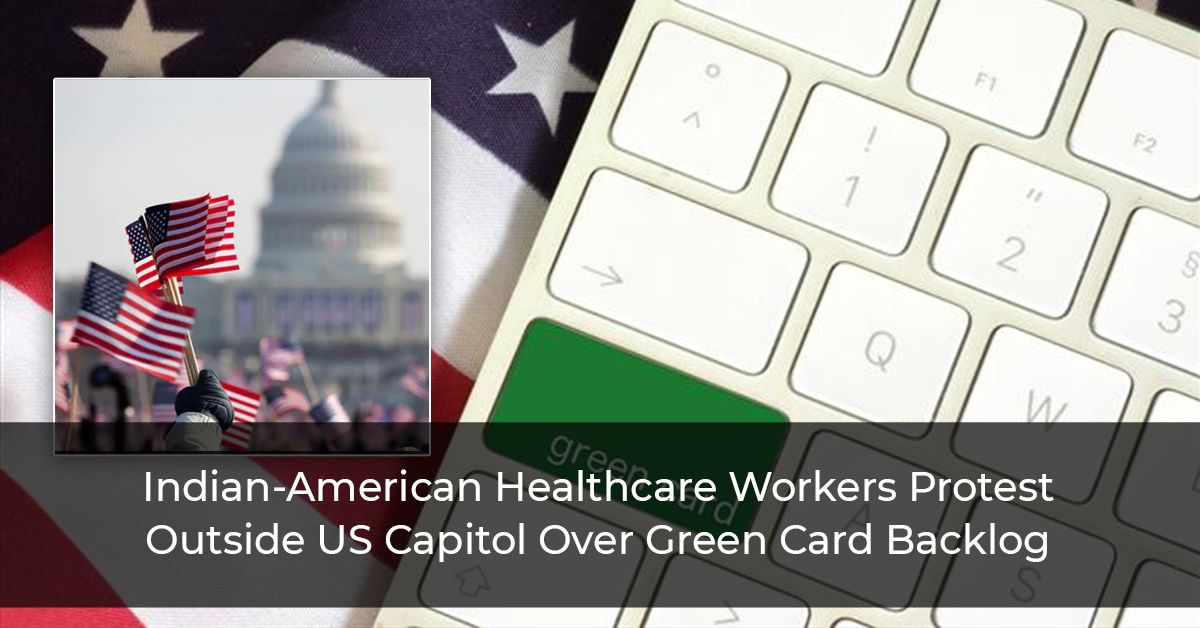Highlights:
- A protest was organised in front of the US Capitol by a group of Indian-American frontline healthcare staff who are trapped in the Green Card backlog
- The worst victims of the current immigration system are Indian IT professionals, the majority of whom are highly qualified and come to the US mostly on H-1B work visas
- A Green Card (Permanent Resident Card) is a certificate given to immigrants to the US as proof that they have been granted the right to live permanently in the country
In front of the US Capitol, a group of Indian-American frontline healthcare staff protested the per capita country-specific quota, urging lawmakers and the Biden administration to end it.
A Green Card, also known as a Permanent Resident Card, is a certificate given to newcomers to the United States as proof that they have been granted the right to live permanently in the country.
The current immigration system, which imposes a 7% per country limit on allotment of the coveted Green Card or permanent legal residency, is wreaking havoc on Indian IT professionals, the majority of whom are highly qualified and come to the US primarily on H-1B work visas.
We’re COVID frontline warriors, and we’re here to tell you how you’ve been duped into a life of indentured servitude. Each of us has a unique story to tell. We’ve travelled from all over the world to demand justice. Dr. Raj Karnatak, an infectious disease and critical care physician, and Dr. Pranav Singh, a pulmonary and critical care physician, said that justice has been denied to them for decades.
Also Read: Geeta Phogat’s Cousin, Wrestler Ritika Phogat Dies, Police Suspect Suicide
The majority of us are Indians. We received our medical training in the United States and took an oath to serve the sick and in need. The majority of us work in rural and underserved areas. In a joint statement, the two Indian American doctors who organised the peaceful protest said: “We are in a Green Card backlog due to outdated country caps that allow no country to get more than 7% of employment-based green cards.”
According to them, many high-skilled immigrants are unable to move jobs due to a decades-long backlog in fear of losing their place in the Green Card line, and are therefore indentured to one employer.
Can only work in the specialty profession for which the visa was granted. According to them, many healthcare employees will be unable to serve in COVID-19 hot spots because their visas are linked to their job and employer.
President Joe Biden should guide United States Citizenship and Immigration Services (USCIS) to end the Green Card backlog for frontline healthcare employees by using unused green cards from previous years, according to the small group of protestors.
A fairness bill which was termed HR 1044, was approved by the House of Representatives in the year 2019 with 365 votes, and in the year 2020, its Senate equivalent, S386, was passed by the Senate.
It’s now back to House in a changed form. They said that Representative Zoe Lofgren, the bill’s first co-sponsor, has shown little interest in taking the bill to a vote as a compromise option to end the suffering of qualified professionals, such as frontline healthcare workers.
Dr. Karnatak and Dr. Singh pointed out that, despite having a population of over a billion people, India receives the same number of green cards as a nation the size of Iceland.
H-1B visas are used to bring high-skilled Indian employees to the United States. The H-1B visa has no country limit, and Indians account for half of the H-1B workforce due to their sheer population.
The H-1B visa is a non-immigrant visa that enables US companies to employ from other countries for specific jobs that need theoretical or technological expertise. It is the most common among Indian IT professionals. It is dependent on it for the recruiting of tens of thousands of workers each year from countries such as India and China.
Also Read: CBI Registers Case Against Cadbury India For Illegally Obtaining License For Himachal Factory
The inhumane Green Card backlog is triggered by the difference between the number of H-1B visas recruited from India and the limited number of green cards allotted to India.
According to them, the Green Card backlog is having a negative effect on the technical and personal lives of high-skilled immigrants from India, including frontline healthcare workers.
Frontline healthcare staff need urgent assistance; they have been in pain for a long time. The least we deserve as frontline healthcare workers who are putting their lives on the line in this pandemic is assurance. A guarantee that if we die or become disabled, our children and families will not be deported, according to the protestors’ joint declaration.
A policy was revoked by US President Joe Biden which was put into effect by his predecessor, Donald Trump, during the pandemic caused by the novel Coronavirus which prevented many Green Card applicants from entering the country.
In his proclamation reopening the country to people seeking green cards, or legal permanent residency, Biden stated that former President Donald Trump’s strategy does not advance the country’s interests.
On the contrary, he claims, it hurts the US by preventing some family members of US citizens and lawful permanent residents from joining their families in the country.
Nearly 473,000 eligible family-based Green Card applications are currently pending in the United States.
The ban imposed by Donald Trump on issuing green cards resulted in a loss of close to 1,20,000 family-based preference visas. However, this was a huge help in terms of issuing employment-based green cards, especially to those on H-1B visas.


